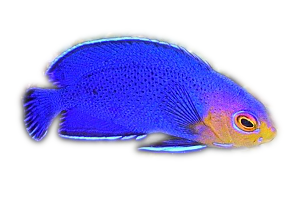
By Bob Goemans

Likely Reef Tank Suitable
Likely Fish-Only Tank Suitable
Range: Central Pacific Ocean: Marshall, Cook, Johnson and Hawaiian Islands.
Size: 6 inches (15 cm)
Natural Environment: Inhabits outer deep fore-reef slopes near black corals at depths between 90 – 400 feet (27 – 120 m) and feeds on plankton, soft corals, tubeworms and other benthic invertebrates.
General Husbandry: One of the hardiest and very easy to feed butterflyfish, yet often somewhat highly priced because of collection depths. Its also quite attractive, having its body coloration divided on a diagonal between black and white, a yellowish-gold eye band edged in black, white pelvic fins and a yellow tail.
Preferrably maintained in larger peaceful fish-only aquariums with somewhat dimmed lighting since this is a deep water species, especially those with lots of open swimming space, and live rock hiding places even though a somewhat bold species in captivity.
It can also be successfully maintained in brightly lit reef aquariums with most soft and stony corals, yet not fully trustworthy as its been known to nip various corals and tubeworms and feed on other useful small worms. It also has an appetite for anemones, good or bad, and can decimate Aiptasia anemones.
As to diet, a meaty diet of live fortified brine shrimp and/or black worms (Lumbriculus variegatus) is a good beginning. Once feeding regularly, various frozen meaty foods such as mysis can be offered several times daily.
Not a difficult species to get feeding in captivity, yet should there be a problem, small human consumption clams/black mussels purchased in local grocery stores and placed on the half-shell in the aquarium may help entice it to begin feeding. Over time, frozen foods like mysis and brine shrimp may be more readily accepted.
Taxonomy:
Order: Perciformes
Suborder: Percoidei
Family: Chaetodontidae
Genus: Chaetodon
FYI: Bold species and often aggressive towards tankmates.
Can be maintained with others in the same genus or with others from other butterflyfish genera, yet all should be introduced at the same time.
Juveniles acclimate more easily to aquarium life than do adults.
Pressing some soft foods into openings/crevices on a piece of old dead coral skeleton can sometimes encourage finicky eaters to begin feeding.
Experience Level: Intermediate
Temperament: Peaceful
Diet: Carnivore
Coral Safe: With caution
Invertebrate Safe: With caution
Acclimation Time: 30 minutes+
Aquarium Environment: Fish-only aquarium
Tankmates: Peaceful or non-aggressive
Minimum Tank Size: 100 gallons
Temperature Range: 70 - 76°F (21 – 24°C)
Specific Gravity: 1.020 -1.026
pH: 8.0 - 8.5
.jpg)